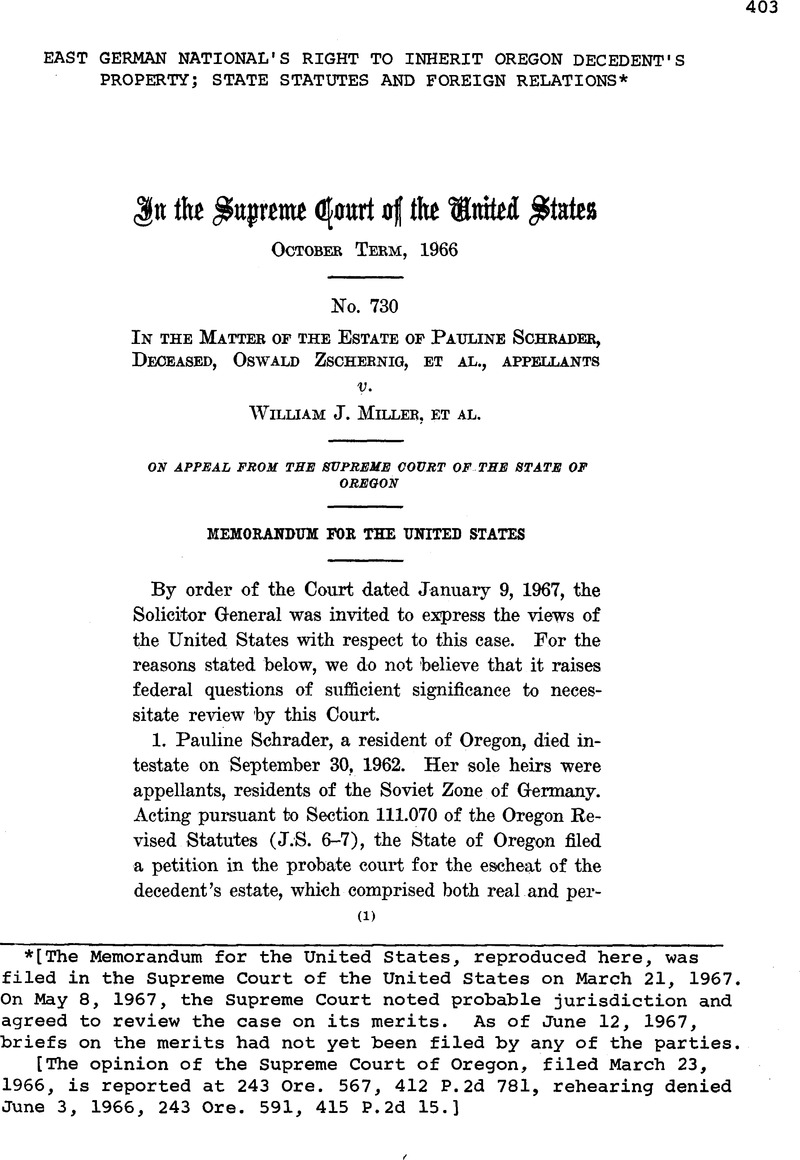No CrossRef data available.
Article contents
East German National's Right to Inherit Oregon Decedent's Property; State Statutes and Foreign Relations*
Published online by Cambridge University Press: 20 March 2017
Abstract

- Type
- Judicial and Similar Proceedings
- Information
- Copyright
- Copyright © American Society of International Law 1967
Footnotes
[The Memorandum for the United States, reproduced here, was filed in the Supreme Court of the United States on March 21, 1967. On May 8, 1967, the Supreme Court noted probable jurisdiction and agreed to review the case on its merits. As of June 12, 1967, briefs on the merits had not yet been filed by any of the parties.
[The opinion of the Supreme Court of Oregon, filed March 23, 1966, is reported at 243 Ore. 567, 412 P.2d 781, rehearing denied June 3, 1966, 243 Ore. 591, 415 P.2d 15.]
References
1 December 8, 1923, 44 Stat. 2132, T.S. No. 725 (effective October 14, 1925), amended June 3, 1935, 49 Stat. 3258, T.S. No. 897. Hereafter referred to as the 1923 Treaty.
2 7 U.S.T. & O.I.A. 1839, TIAS No. 3593 (effective July 14, 1956), hereafter referred to as the 1954 Treaty.
3 For purposes of this litigation the California statute in Clark v. Allen cannot be distinguished from the Oregon statute. Appellants point out that the Oregon statute is in one respect more stringent than the California statute in that the California statute did not contain a provision similar to Section 1(c) of O.R.S. 111.070, which requires foreign heirs to prove that they will "receive the benefit, use or control" of their inheritance (J.S. 14). However, Section 1(c) was not critical to the result in the Oregon courts. The heirs also failed to meet the necessary criteria of Section 1 (a) and (b), standards also found in the California statute. Indeed, as the court below noted, they did not even contend that the requirements of Section 1(b) could be met (J.S. App. 16). Thus, if, as this Court held in Clark v. Allen, the first two standards were permissible, there would be no occasion to consider the permissibility of the third.
4 See Petition for Rehearing and Brief, p. 17.
5 The Department of State takes the position that the Oregon court correctly ruled that the 1954 Treaty does not apply to the Soviet Zone, that the 1923 Treaty is still effective, and that the latter is applicable to the Soviet Zone.
6 See Head v. New Mexico Board of Examiners in Optometry, 374 U.S. 424; Huron Portland Cement Co. v. City of Detroit, 362 U.S. 440.
7 If the decedent had died a national of Germany, it would be clear that the 1923 Treaty does apply. Clark v. Allen, 331 U.S. at 516. The record does not reveal Mrs. Schrader's nationality, but the Oregon court assumed that she was American (J.S. App. 19, n. 5). In so doing, the court relied on this Court's similar assumption in Clark. But there the Court simply held that the government was not entitled to a judgment on the pleadings in the absence of an allegation as to the decedent's nationality (331 TJ.S. at 516).
8 The State Department's view of the 1923 Treaty was not accepted by the Court in Clark v. Allen. See, in this connection, Meekison, Treaty Provisions for the Inheritance of Personal Property, 44 Am. J. Int'l L. 313 (1950).




